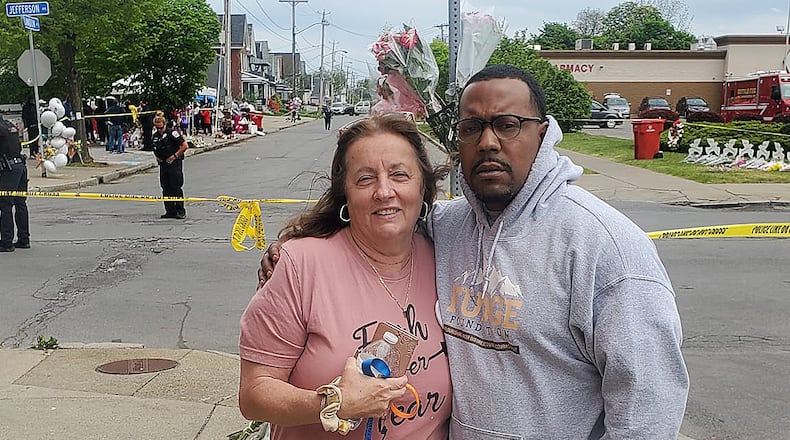“I just want to be there to be part of a support system and be there to speak to,” Green said. “They might have help out there but from my experience, I rather speak to somebody who’s been through what I’ve been through, it’s more relatable.”
Green was by his Springfield father’s side in the Oregon District when Derrick Fudge became one of the nine victims in the 2019 mass shooting. He said hearing that the Buffalo shooter was wearing body armor and carrying ammunition — like the Oregon District shooter — was traumatizing.
“It makes my visions come back to the forefront,” Green said.
“We are coming up on three years and it made it back to Day 1 again,” he said. “And that’s all survivors across the country that have experienced this type of stress. The impact of gun violence never goes away.”
The Buffalo shooting is being described by police as racially motivated. Ideas from the “great replacement theory” filled a racist screed supposedly posted online by the white 18-year-old accused of targeting Black people in Saturday’s rampage. Authorities were still working to confirm its authenticity.
Paul Becker is an associate professor at the University of Dayton who has studied right-wing extremism for 30 years. He said the great replacement theory is the idea that an increase in the non-white population, primarily fueled by immigration, is designed to destroy white and western culture. He also said the followers believe there is an organized plot to replace white people.
He said the conspiracy theory has been around for decades and is becoming more mainstream.
“You have the fringe element that may be right now more willing to use violence as a reaction to this, but you’re seeing individuals promoting these ideas,” he said.
Becker said he suspects that the belief is common enough that you will find it in most places, including the Dayton region.
Dayton Unit NAACP President Derrick Foward said racism exists here and local law enforcement needs to be on high alert for threats. He said violence can inspire others to commit more violence, so threats need to be taken seriously.
“We would urge our law enforcement agencies here in Montgomery County ... if they are monitoring Facebook accounts of people who they have identified as potentially bigoted, they need to put them on a watch list effective immediately and start watching these individuals so we don’t have another lone wolf here,” Foward said.
He said the local NAACP unit sends their condolences to the people affected in Buffalo and that their hearts and prayers are with them.
Green said he is frustrated, angry and heartbroken that families in Buffalo joined a “network that they did not ask to sign up for” and that more hasn’t been done to prevent mass shootings from taking place.
“How many more lives do we have to keep sacrificing for them to understand that we need to do something and it needs to happen now because this weekend was a violent weekend throughout our country,” Green said.
Another Oregon District survivor, Travis Osborne said while he isn’t impacted psychologically by other mass shootings, he does feel empathy for those whose lives have changed because of the violence.
“It’s tragic and it’s kind of sickening to know that the stuff that happened to me continues to happen in other ways,” he said.
Osborne was shot in his right arm during the Oregon District shooting, shattering his humerus, and doctors had to take an artery from his leg to restore blood flow to his hand. He said he’ll likely never be back to 100% health, but is able to live a “fairly normal life.”
He said he didn’t like people using the Oregon District shooting to further political agendas and still thinks it’s wrong to do. He said changes in the law should be discussed and deliberated and how mental health is handled needs to be examined also.
“The negative politics of it come out and it pushes people further into division and I think it’s a huge problem,” he said.
He said when he hears about a mass shooting, he thinks about what the victims are probably experiencing because that’s his point of view. He said many people here were devastated by the local shooting and the needs of victims suffering from mass shootings should come first.
The Associated Press contributed to this story
About the Author

